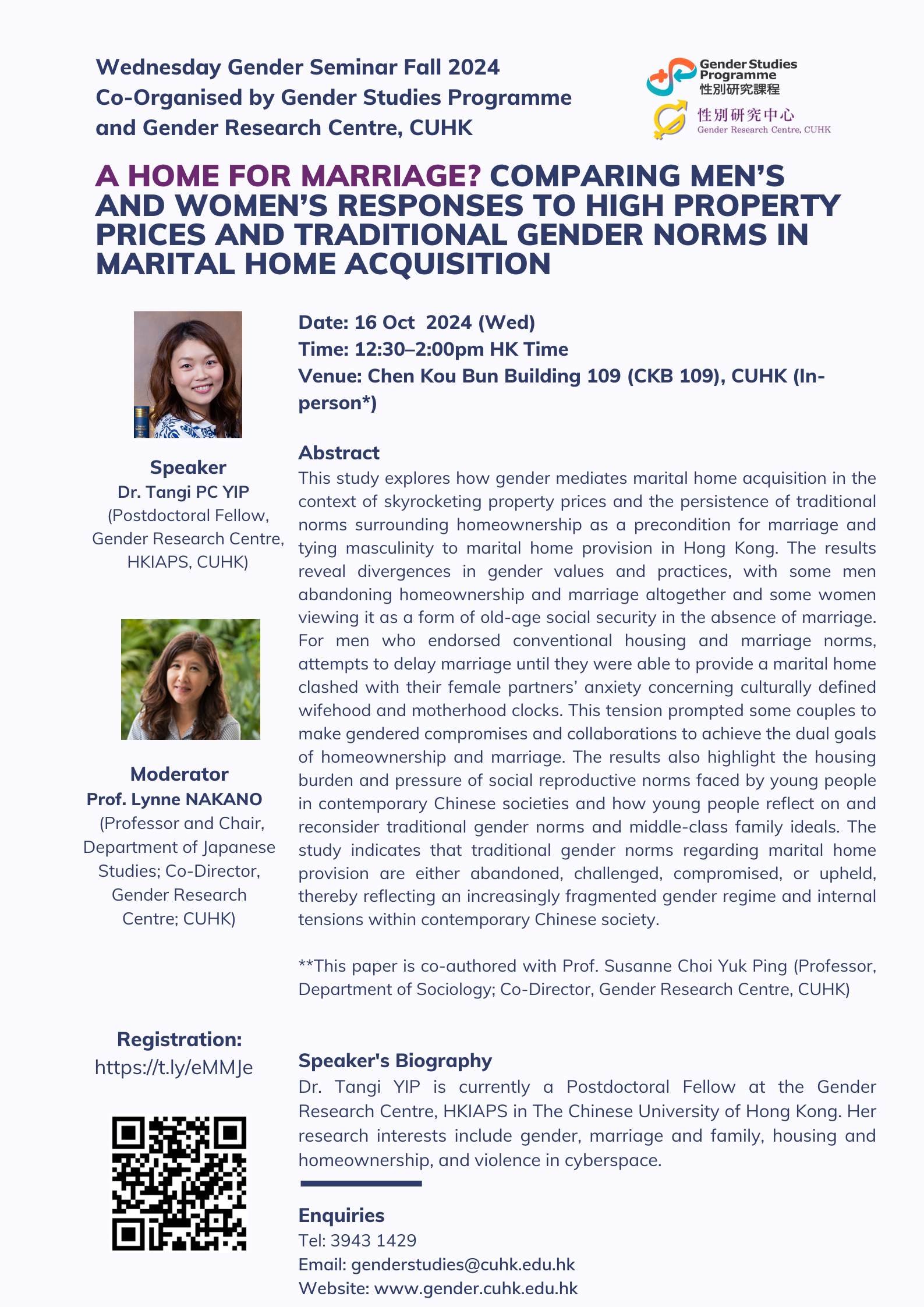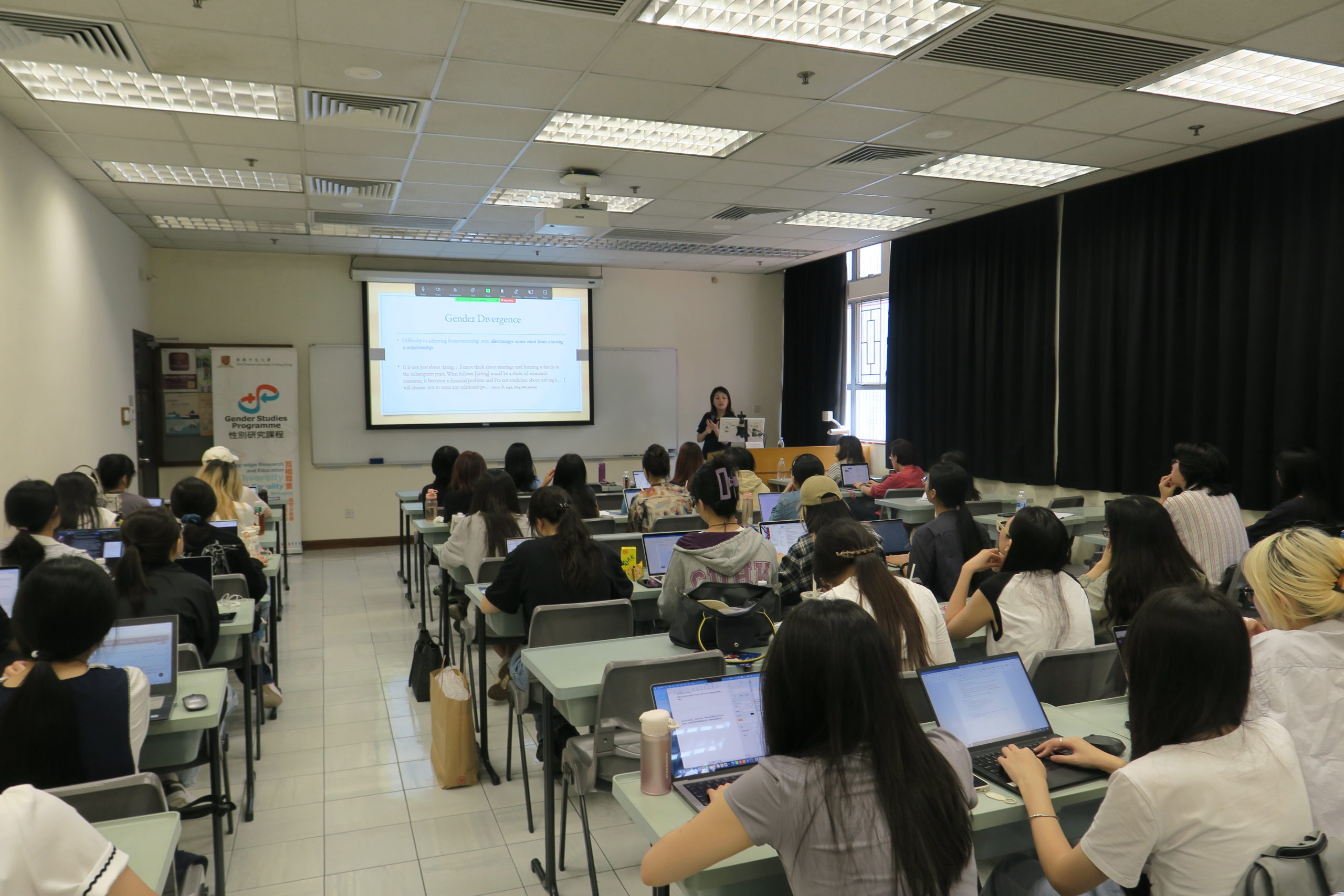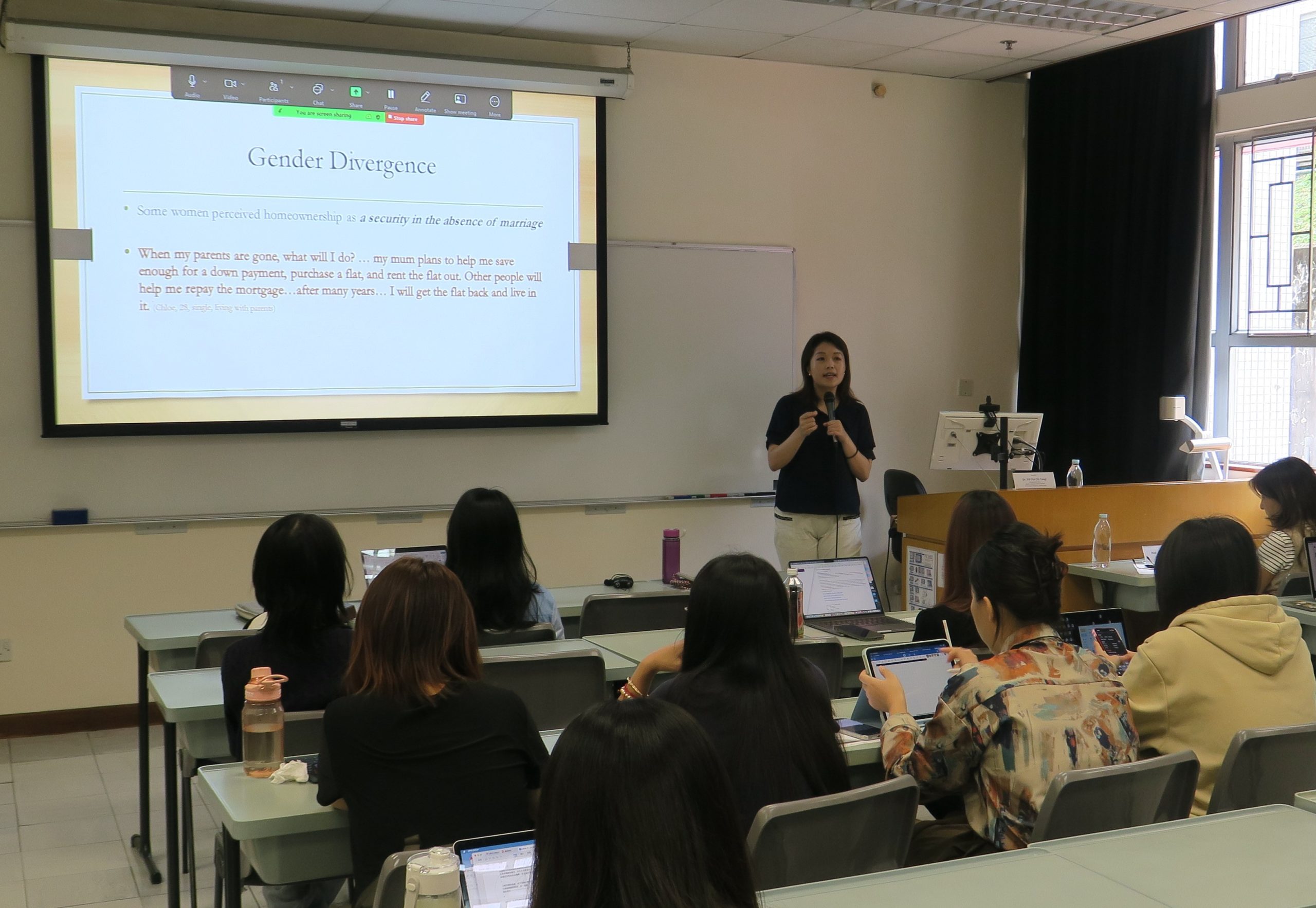會議上,Dr. Tangi PC YIP首先介紹了本次研究的背景,指出在傳統社會觀念下,婚房通常被視為婚姻的前提條件,男性則主要承擔著提供婚房的責任。然而,隨著香港房價在過去幾十年裏不斷攀升,年輕人面臨的購房壓力急劇增加,這不僅影響了他們的婚姻決策,也引發了一些在購買婚房上對於性別責任的重新思考。
通過訪談發現,香港年輕人在面對婚姻和購房的雙重壓力時,男性和女性會呈現出不同的反應和應對方式。許多年輕男性仍然堅持認為購房是結婚的必要前提,部分男性甚至因無法負擔房產而暫時放棄婚姻計畫,表示自己在存夠一定的首付後才會考慮結婚。而女性則由於時間壓力(例如年齡焦慮、生育年齡的限制等)對於婚姻的需求更加迫切,因此更容易在購房安排上做出妥協,例如在婚後與父母同住等,以便更快進入婚姻。同時,研究還發現,香港年輕人普遍抗拒父母在購買婚房時給予一定的財務幫助,這種拒絕一是出於個人對經濟獨立和成就感的追求,二是擔心父母的老年生活會因此而得不到保障,從而增加自身的養老負擔。
最後,Dr. Tangi PC YIP強調,儘管香港的年輕男女在婚姻和購房問題上展現出了一定程度的性別平等態度,例如相比過去由男方全資購買婚房,如今的香港女性普遍也會承擔30%-40%的購房首付以體現自身的獨立性。但值得注意的是,絕大多數婚房房產仍只登記在男性名下,這種表面上看似公平的合作模式雖然在一定程度上緩解了婚前購房壓力,但也可能在離婚時導致女性在財產分配中處於不利地位,存在一定的隱患。
Written by: SUN, Siyu
本次講座主要由葉博士后介紹了她對香港男女在房價上漲和經濟不確定性的背景下購買住宅的態度和行為響應的研究,特別是傳統性別規範在婚後住宅購買當中的體現。
首先葉博士后提出以下三個研究問題:變化中的經濟與住屋現實如何塑造年輕男女對於性別住屋規範的態度?在結婚和購屋的過程中,男女如何處理自己和伴侶的期望?他們如何協商與合作?然後她在2018-2020年間開展對50名受訪者的深度訪談,通過對訪談資料進行開放性編碼,整理總結出了以下幾個研究結論:①在性別化的住房規範方面,男女存在著較大差異。例如結婚與購房的優先級問題,購房對於自身、家庭和未來的意義問題,男性和女性表現出了性別差異。②在婚後住宅獲得過程中,存在著性別妥協和性別協作兩大特征。其中性別妥協方面,包含了男性在性別理想上的妥協和女性在婚後住房安排上妥協。在性別協作方面,包括了男女雙方在經濟支持、房產署名等方面的協作。需要註意的是,雖然傳統性別規範深刻影響了男女雙方的行為,但是仍有部分女性挑戰傳統的男性供養者-女性家庭主婦的規範,堅持提供平等的經濟貢獻。總的來說,該研究揭示了性別規範、財務限製和住房政策之間復雜的相互作用,影響了個人對在香港實現自置居所的態度和策略,特別是在男女婚後的購房策略方面。
Written by: CHEN, Yuxiang
本次講座中,Dr.YIP向我們介紹了她的研究:比較男性和女性在婚房購置上對高房價及傳統性別規範的反應。基於中國社會對進入婚姻的條件界定、住房購置責任的性別化、住房性質商品化、年輕人住房負擔過重的背景,研究主要探討了在當前的經濟和住房環境下年輕男女如何看待購置婚房責任,他們如何在結婚和購房上如何權衡自己與伴侶的期待以及他們在過程中如何進行協商與合作的。Dr.YIP選擇了香港為研究地點,在2018-2020年間對50名年齡在25-34歲的年輕男女進行了深度訪談。她發現了在住房標準上存在著性別差異:無住房的現狀可能會阻礙一些男性展開戀情;對於一些女性來說擁有住房是未婚情況下的保障;擁有住房可以展現父親的責任感和對孩子的承諾;男女在“結婚和買房”哪個該優先完成上有分歧…… 然而男性和女性分別願意在理想的性別角色期待和婚後的住房安排上妥協。女性也願意出資與男性在購房過程中達成合作,但這種合作是性別化的。雖然它解決了女性面臨婚姻的年齡焦慮問題,也解決了男性因房價過高的經濟壓力問題,但由於男性通常在住房出資上貢獻高於伴侶並且財產往往在男性名下,所以新的不平等和壓迫形式可能在家庭內部誕生。在此種情況下,如果夫妻離婚,女性的利益將受到極大的侵害,因為她們可能會失去在住宅上的合法居住權。
總的來說,研究展現了在香港高房價背景下,性別如何影響婚姻與購房決策,以及傳統性別規範如何被挑戰、妥協或維護,從而反映出社會性別制度的變遷和內部矛盾。
Written by: LUO, Xiran
Hong Kong is experiencing the process of housing commodification and rising property prices, which impacts what is termed “a package deal,” the duality of (heterosexual) marriage and homeownership in a predominantly Chinese society with traditional gender expectations. Using in-depth interviews with highly educated individuals aged 25-34, this research aimed to explore how gender mediates the relationship between marriage and homeownership in Hong Kong. Findings showed that the mandate of masculine marital home provision often conflicts with women’s urgency to marry before cultural deadlines. High housing prices may deter young men from even starting a relationship, which implies assuming the primary role of marital home provision. Young people’s perceptions on homeownership are gendered: men see it as an expression of responsible fatherhood and a commitment to children, while women perceived it as an old-age security in the absence of marriage. These perceptions lead to gendered compromises: women increasingly decoupled homeownership with marriage, accepting alternative housing arrangements after marriage. Regarding parental financial support, many young people struggle between the ideal of self-reliance and economic realities. The studies found that respondents did not necessarily welcome their parents’ home financing, with some explicitly rejecting parental assistance due to concerns about preserving decision-making power. Others carefully delineated financing responsibilities in their housing projects, attempting to establish their financial responsibility even when agreeing to accept parents’ money. The research highlighted that women’s and men’s practices in financing their marital home often diverge from traditional gender norms, with women often contributing substantively to both down payment and mortgage payments. However, this contribution doesn’t always translate to legal ownership, representing an “unequal gendered collaboration.” In general, these findings illuminate the complex interplay between housing affordability, gender expectations, and family dynamics in a rapidly changing urban environment.
Written by: LIN, Zhensheng
This week Dr. Yip Pui Chi Tangi, introduced her research: A Home for Marriage? Comparing Men’s and Women’s Responses to High Property Prices and Traditional Gender Norms on Marital Home Acquisition. The study especially focuses on Hong Kong young people’s point of view on marital housing and how they deal with conflicts and cooperation. It explores the economic changes and realities affecting young couples’ attitudes towards gender, housing loans, and how they manage their own and their partner’s priorities and expectations.
First, the professor provides the background of the rising prices of the housing context, not only in Hong Kong, but same as in the rest of Asia as well as the West. Data displays that home prices in Munich increased by 11% around 2010, and those in Beijing increased by more than 7%. However, comparing the housing price with the income growth, the extremely rapid rise in the price of home purchasing presents a dangerous trend of the ratio. Through in-depth interviews with 50 different highly educated respondents in a two-year research methods program in 2018, Dr. Yip finds the different reactions of men and women towards house purchasing and marriage.
For men: some men give up pursuing a committed relationship or marriage plan because of the difficulty of home ownership; some men are convinced that buying marital housing is a responsibility for their future family and children, which is related to marriage, fatherhood, and masculinity; some men consider the cost-effectiveness of buying a house versus renting a house from an economic perspective and believe that renting a house helps the landlord pay off their mortgage, which is ineffective. Some men refuse to receive help or money from any part of their parents and insist on being independent and relying on their own.
For women: some women see home buying as retirement security rather than expectations for marriage; many women still associate house purchasing with marriage, believing that being a homeowner is a prerequisite for getting married and starting a new family, expressing anxiety about marriage, being a “leftover woman,” and childbirth; some women make compromises on marital housing arrangements in order to speed up the marriage process, including accepting renting a house, living with parents-in-law, or even temporarily separating. Some women cooperate with their partners to buy a house and contribute a portion of the down payment, but still, some women do not have their names registered on the properties due to government housing policies and other reasons. In addition to that, some women insist on equal financial contributions to challenge the traditional male provider role.
Written by: NI, Yi





A
A
A
聯絡我們